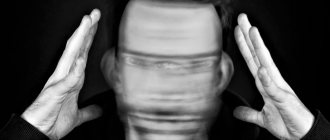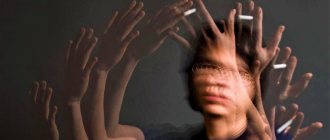Medical illiteracy pushes people to look for any diseases in their own bodies. Only an experienced specialist who understands the finest details of the disease’s manifestations, signs, and symptoms can diagnose the disease. Fear of schizophrenia is common, but mental disorders are fortunately quite rare.
Fear of schizophrenia is often associated with a person’s independent attempts to diagnose himself
The root of fear, or where does the fear of schizophrenia come from?
Lyssophobia can manifest itself in parallel with the fear of getting sick from other serious illnesses
The fear of schizophrenia, like any other phobia, indicates that the person’s psyche is not strong enough. As a rule, the fear of schizophrenia does not come out of nowhere, and is either a consequence of existing problems, for example, neurosis, neurasthenia, or even ordinary stress, or a fear of repeating the fate of someone close, for example, if there have already been cases of this dangerous mental illness in the family .
Another reason for the fear of developing schizophrenia can be a person’s excessive sensitivity and suspiciousness. As a rule, in such cases, fear develops in childhood or adolescence, and occurs against the background of watching movies that clearly highlight the problem of this disease.
Fear of schizophrenia may be a variant of fear of death. In the case of severe thanatophobia, there is a gradual development of fear of contracting serious and incurable diseases - cancer, schizophrenia, AIDS, etc. It is quite possible for a certain group of people to develop cross-phobias, so this option cannot be excluded.
In general, any fears are a serious problem, indicating exhaustion of the nervous system. A psychotherapist and psychiatrist will help you better understand the causes of fear. It is recommended not to delay your visit to the doctor in order to be able to overcome your phobia faster and more effectively.
Causes
The causes of fear of schizophrenia depend on many factors: the individual’s resistance to stress, his relationships with family and loved ones, social status and predisposition to mental disorders. Hypochondriacs are more often subject to an illogical fear of going crazy and losing sobriety of thinking. Reasons for fear of schizophrenia:
- physiological characteristics of the body (diseases that weaken its defense mechanisms),
- primary phobias that weaken the psyche,
- incorrect attitudes laid down in childhood,
- rare mental disorders that are diagnosed in late stages.
Fear of schizophrenia occurs against the background of one or several reasons. Fear of getting sick, reinforced by primary phobias, is difficult to diagnose and treat.
It is more difficult to identify phobias with reasons that a person does not recognize as dangerous preconditions for the phobia. True schizophrenics have virtually no fear of mental disorders.
Determining the root cause of fear will allow you to get rid of the obsessive state. It is more difficult for adults to cope with a phobia if they were raised in fear of the disease as children: the mere thought of the possibility of developing schizophrenia causes panic attacks. Children's attitudes must be combated through a long course of psychoanalysis and psychotherapy.
Fear of schizophrenia can have different causes
Panic attacks
Phobias and panic attacks are related concepts. Attacks of uncontrollable fear are accompanied by suffocation, severe headaches and tremors of the limbs. Panic attacks that occur against a background of prolonged stress or another phobia contribute to the development of lissophobia. During an attack, a person loses control over the body - his breathing becomes difficult, coordination of movement is disrupted. On a subconscious level, the victim convinces himself that this could happen again soon. Fear develops into a persistent obsessive state.
The more often a panic attack is repeated, the more this symptom resembles attacks of sluggish schizophrenia. The individual’s thinking changes; she perceives herself as a sick person with a mental disorder.
Social phobia and related phobias
Primary phobias destroy the body's defense mechanisms. They distort the perception of reality: the person does not feel protected, he lives in constant anticipation of trouble (illness).
Fear of sluggish schizophrenia is the way through which accumulated tension is released. Whether it is fear of cancer, AIDS or infection, a person experiences horror at the thought of illness. He lives in created fear, experiences it day after day. Without accompanying phobias, the human psyche is more resistant to stress. It is easier for suspicious people to invent symptoms and bring fear to physiological manifestations. A symptom of a primary phobia is an alarming sign that indicates a necessary examination by a doctor.
Vegetovascular dystonia
A disease such as VSD is a relic of the Soviet period: the diagnosis, which was given to adults and children, is still not recognized in Europe. Fear of low-grade schizophrenia occurs against the background of problems with the cardiovascular system. Signs of VSD are expressed in general weakness of the body, headaches and confusion.
Symptoms of vascular disease (parasympathetic and sympathetic nervous system) are accompanied by obsessive fear. A person is afraid of getting schizophrenia due to long-term and ineffective treatment of VSD.
Neuroses and phobia
Fear in neurosis is a natural phenomenon. Increased tension and anxiety create suitable conditions for the development of various phobias. Favorable conditions for the development of fear:
- neurasthenia,
- anxiety disorder
- stress disorder,
- PTSD (post-traumatic disorder),
- hypochondria.
With neurosis, a person does not control his own defensive reactions. He gives in to panic, apathy or irritability. Powerlessness turns into increased excitability, sleep patterns are disrupted, and appetite disappears.
With neurosis or neurasthenia, a person cannot concentrate. He is distracted and confused. In most cases, a phobia indicating a false diagnosis is a salvation - a solution to a serious condition.
Anxiety disorder is accompanied by stress on the psyche. A person experiences fear and directs it to any action. A phobia is a continuation of an anxiety state.
In soldiers injured in hostilities, after returning home, PTSD manifests itself with various symptoms: feelings of guilt and increased anxiety result in a phobia. It becomes the main cause of anxiety and turns life around one ritual - confrontation with schizophrenia.
Feeling powerless can lead to loss of appetite
Phobias of hypochondriacs
Hypochondriacs find the cause of internal tension in illness. People who are afraid of infections, viruses, diseases transmitted through contact with a sick person, build their lives around the search for pathologies. Even minor symptoms become a reason to consult a doctor and undergo dozens of tests. The whole life of a hypochondriac consists of one ritual - confronting the threat.
The behavior of schizophrenics is less logical. Mental disorders are expressed by completely different symptoms: a person becomes fixated on one idea or there is a change of personality, a game of a new personality. A schizophrenic is rarely aware of the disease and its impact - this is the main difference between hypochondriacs and real patients. Anxiety is not associated with the disease itself, but with the possibility of contracting it.
Women's fear
Women have low resistance to stress. If there have been cases of mental disorders in the family, in most cases they will be transmitted through the female line. Adverse habits (alcoholism, drug addiction, use of psychotropic substances) aggravate a woman’s mental state.
Postpartum psychosis worsens the stability of the female psyche. The hormonal changes that occur in the body of the expectant mother are to blame.
Alcoholism worsens a woman's mental state
Who is at risk?
A person with a strong, healthy psyche does not face pathological fears - this is a fact. Thus, the presence of any phobia indicates that the nervous system is not in order and needs help.
The fear of getting schizophrenia is direct evidence that a person does not have schizophrenia. The fact is that schizophrenics never realize their illness, being confident that they are healthy, but the whole world is actually sick.
Most often, fear of a mental disorder is a consequence of an existing mental disorder. Thus, the risk group consists of people who do not know how to deal with stress. Many stress factors gradually weaken the nervous system, it does not have time to recover, resulting in neurosis-like conditions, against the background of which phobias rapidly develop and progress.
The risk group also includes people who have a history of schizophrenia in their family. This is the only group for which the fear of disease is completely justified. The fact is that schizophrenia is conditionally inherited. Conditionally, this means that it is not the disease itself that is transmitted, but the increased risk of its development. However, here it is better to turn to statistics: for any person the risk of schizophrenia is 1%, for people with a family history - 2-6%, depending on the degree of relationship. So, if a grandmother or grandfather had schizophrenia, but one of the parents did not have the disease, the risk is 2%. If one of the parents is sick, the chance increases to 4-6% (according to various sources).
Thus, even with a burdened heredity, the pathological fear of illness, which has developed into a real phobia, is rather irrational, since the risks increase slightly compared to completely healthy families.
Fear of getting schizophrenia
The fear of becoming a victim of mental illness does not seem to be as widespread as cancer phobia, but it is still a serious problem. Most often, such a phobia accompanies other mental disorders (but is never combined with schizophrenia itself): neuroses, obsessive-compulsive disorder, panic attacks and depression. In other words, if a person is afraid of going crazy or observes the characteristic symptoms of a schizophrenic disorder, this means that he is healthy or almost healthy. A real patient with schizophrenia will never suspect that he has it: on the contrary, due to the so-called delusional awareness of what is happening (this is a state when the “oddities” surrounding the schizophrenic finally add up to a coherent picture on a global scale), it will seem to him that there is something wrong with those around him .
However, the obsessive fear of madness - lissophobia - requires contacting a psychotherapist. In this case, they will not treat you for schizophrenia, they will not call you a schizophrenic, but they will help you cope with the main, real problem, which is not madness at all.
Reasons for developing a phobia
Frequent depressive moods can lead to the development of psychopathology
Any healthy person is afraid of contracting a dangerous disease - and this is normal, but the irrational fear of schizophrenia, which poisons a person’s life, is a type of mental disorder that needs to be treated. Strong fear does not come out of nowhere; it always has reasons. If a person is horrified by mental illness, the cause must be sought in existing illnesses. As a rule, the disease schizophrenia stems from the following mental disorders:
- neurosis;
- obsessive-compulsive disorder;
- depression;
- anxiety disorder.
All of these disorders are highly treatable. The problem is that most people tend to brush off the initial symptoms and not pay attention to the problem at hand. Since all these disorders are associated with nervous exhaustion, they progress quite quickly, “overgrown” with additional problems, in particular, lissophobia.
Doctors call the specifics of upbringing in childhood another unobvious reason for the development of fear of schizophrenia. Thus, some authoritarian parents tend to question the mental health of their children. As soon as a child does some “childish stupidity” (picking up a stone on the street, petting a stray cat, scratching a mosquito bite until it bleeds, etc.), the parents begin to swear without choosing an expression. As a result, children often hear offensive words addressed to them: “mentally retarded,” “stupid,” “crazy,” and the like. Considering the fact that parents often raise their voices and try to control the child in everything, such children grow up in constant stress, which depletes the nervous system and transforms into neurosis with age.
Patients with neurosis often experience fear of contracting schizophrenia and tend to doubt their mental health. This is a serious problem that requires the help of a qualified specialist.
Manifestations of Fear
Hypochondriacal anxiety of low-grade schizophrenia is a way for the patient to explain his condition. A person suffering from this fear pays attention to all manifestations of his “abnormality” and considers them in relation to possible schizophrenia. Sometimes such fear occurs during panic attacks, which unsettle a person and make them think about their mental health.
What makes one even more afraid of schizophrenia is the variety of Internet resources that a person often turns to in search of answers to questions that interest him.
This information is most often far from the truth, it only frightens him and makes him worry about his psyche even more, thereby exacerbating the manifestations of lissophobia. You can often read that the symptoms of the development of the disease are phobias, anxiety, isolation and a whole range of other psychological problems that are typical for many. A person whose knowledge of psychiatry is limited to information obtained from the Internet may notice similar “symptoms of schizophrenia” in himself.
There is a lot of information on the Internet that makes a person afraid of a mental disorder.
How does a phobia manifest itself?
Lissophobia, unlike object phobias, is manifested by various symptoms that convince the patient of his “illness.” Since there is no classic subject of phobia, the signs of lissophobia worsen in moments of stress or emotional upsurge. In other words, thoughts about schizophrenia appear only when the psyche is under stress.
Since this phobia is closely related to neurosis, exacerbation of symptoms can occur with physical or mental fatigue. Some patients claim that symptoms worsen even if they simply did not get enough sleep.
In the words of one of the patients: “I am afraid of schizophrenia only when I feel that the fear has a basis. For example, after working intensively all day, it begins to seem to me that I hear extraneous sounds and am about to go crazy. True, once you have a good rest and take a sedative, all the symptoms go away and the phobia recedes. It took me many years to pluck up the courage to see a doctor, before that I really thought I was schizophrenic.”
Panic attacks
There is a feeling as if something is pressing on the brain
Phobia of mental illness is manifested by a number of psychosomatic symptoms. One of these manifestations is panic attacks. It should be noted that panic attacks themselves are a separate disorder that requires treatment. Symptoms:
- sudden feeling of anxiety;
- rapidly growing panic;
- a jump in the level of adrenaline in the blood;
- strong heartbeat;
- feeling of lack of air;
- feeling of pressure in the head;
- desire to escape quickly;
- disorientation in space.
A panic attack manifests itself as an attack. Typically, attacks last from a few minutes to half an hour and go away on their own. Symptoms can be relieved with the help of a sedative, breathing exercises, or other stress management techniques.
It should be noted that panic attacks may not be a symptom of a phobia, but due to the specific nature of such attacks, patients often begin to doubt their own mental health.
Social phobia
Another phobia closely related to the fear of schizophrenia is social phobia. According to recent data, social phobia is the most common phobia and can take various forms. In general, it manifests itself in the following:
- fear of doing the wrong thing;
- fear of being in a crowd;
- fear of responsibility;
- fear of outsiders' assessment of one's own actions;
- decrease in social contacts;
- sense of anxiety;
- constant internal tension when communicating with other people.
In severe cases, this disorder leads to forced social isolation. People with certain personality traits may feel that social phobia is the first sign of schizophrenia.
Neuroses and hypochondria
“Imaginary” diseases are discovered
Neurosis-like conditions, including neurasthenia, are the most common mental disorders that arise from stress. Neuroses are manifested by severe irritability and short temper, with a period of emotional outburst followed by depression and apathy.
Neuroses often develop into hypochondria. With this disorder, it seems to the patient that he is very sick, so patients begin to look for (and find) symptoms of various diseases, in particular schizophrenia. It should be understood that neuroses are most often mistaken by patients for the onset of schizophrenia, and if a hypochondriacal mood is observed at the same time, all this acts as a strong impetus for the appearance of a phobia.
Cancerophobia
One of the most common forms of hypochondria is cancerophobia, in which a healthy person is afraid of getting cancer. A variety of people all over the world suffer from it, because many people know that cancer is a common cause of death (second only, however, to cardiovascular diseases, which no one is so afraid of), and not everyone tolerates treatment for them easily.
Cancerophobia occurs for various reasons. The basis for it may include:
1) reaction to the death of a loved one from cancer;
2) reaction to surgery to remove benign tumors or cysts;
3) the doctor’s comment during the examination (the comment is perceived as a hint or warning);
4) the presence of precancerous diseases (cervical erosion, stomach ulcers, etc.);
5) obsessive-compulsive neurosis, hypochondria, psychopathy, depression, schizophrenia;
6) generalized anxiety disorder;
7) chronic stress, which is accompanied by sudden weight loss;
 chronic pain syndrome (for example, migraine);
chronic pain syndrome (for example, migraine);
9) menopause, when a woman is forced to undergo regular preventive examinations.
Advertising of medicinal and preventive products that supposedly prevent the development of malignant neoplasms also does not add confidence to people in the future and, in fact, seems to push them to the thought: “Do I have cancer?”
All this, of course, does not mean that you need to ignore alarming symptoms, attributing them exclusively to cancerophobia. However, it is necessary to distinguish its effect from truly important changes in health. One of the best ways to do this (and deal with cancerophobia, as well as other similar conditions) is to go to the doctor. No matter how frightening this need may seem (“What if they find something?”), as a rule, a visit to the clinic ends with a feeling of relief. This step itself—visiting a doctor—should be perceived as therapy, an effective way to cope with the horror that has haunted us for a long time. Cancerophobia constantly distracts attention, forces you to listen to yourself, look for lists of symptoms, and this makes you even more scared.
If the fear does not go away after contacting doctors, or if a person knows that he has obsessive-compulsive disorder, hypochondria, psychopathy, depression, schizophrenia, anxiety disorder or other problems, psychotherapy will help to cope with the phobia - along with the underlying mental illness. Maintaining mental health is as necessary as treating your teeth or ears - and there is absolutely no reason to be ashamed of it (after all, we are not ashamed of having been to the dentist or ENT specialist).
Stages of lissophobia
Having figured out what symptoms can be mistaken for a phobia, it becomes clear that the fear of getting schizophrenia does not have specific manifestations. All the symptoms of this phobia are concentrated directly in the patient’s head. Any manifestations of mental exhaustion, stress or neurosis are mistaken for schizophrenia.
So, fear of this mental disorder most often occurs in three stages:
- Stage 1 – irritability, obsessive states, signs of neurosis;
- Stage 2 – progressive social phobia, fixation on thoughts about illness;
- Stage 3 – isolation, social isolation, confidence in the disease.
The problem of the third stage of phobia is that the patient has already “found” the symptoms of schizophrenia, but is so afraid of the disease that he prefers to withdraw into himself and limit communication with other people. People with a phobic disorder often choose to isolate themselves, afraid to face their fears.











